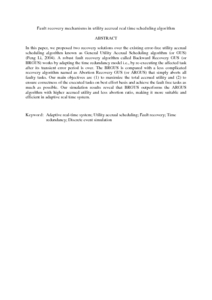Citation
Ahmad, Idawaty and Othman, Muhammad Fauzan
(2009)
Fault recovery mechanisms in utility accrual real time scheduling algorithm.
Computer and Information Science, 2 (1).
pp. 61-68.
ISSN 1913-8989
Abstract
In this paper, we proposed two recovery solutions over the existing error-free utility accrual scheduling algorithm known as General Utility Accrual Scheduling algorithm (or GUS) (Peng Li, 2004). A robust fault recovery algorithm called Backward Recovery GUS (or BRGUS) works by adapting the time redundancy model i.e., by re-executing the affected task after its transient error period is over. The BRGUS is compared with a less complicated recovery algorithm named as Abortion Recovery GUS (or ARGUS) that simply aborts all faulty tasks. Our main objectives are (1) to maximize the total accrued utility and (2) to ensure correctness of the executed tasks on best effort basis and achieve the fault free tasks as much as possible. Our simulation results reveal that BRGUS outperforms the ARGUS algorithm with higher accrued utility and less abortion ratio, making it more suitable and efficient in adaptive real time system.
Download File
![[img]](http://psasir.upm.edu.my/14737/1.hassmallThumbnailVersion/Fault%20recovery%20mechanisms%20in%20utility%20accrual%20real%20time%20scheduling%20algorithm.pdf)  Preview |
|
PDF (Abstract)
Fault recovery mechanisms in utility accrual real time scheduling algorithm.pdf
Download (85kB)
| Preview
|
|
Additional Metadata
Actions (login required)
 |
View Item |

